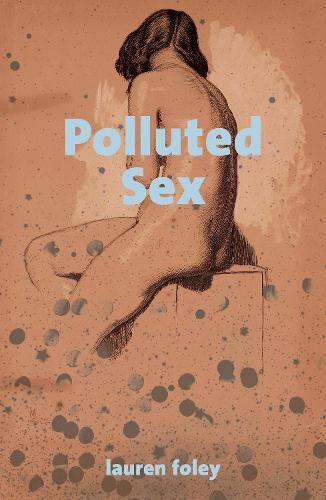

Polluted Sex is a collection of short stories centred around Irish girl- and womanhood. Stylistically they range from traditional realistic narratives to more experimental formats that include visual elements and reworkings of other formats (such as prayers, children's songs or folk tales).
The stories are ordered in a vaguely chronological format, following not one woman but the course of life, starting with narratives about childhood best friendship between girls; getting first period and the shame and trouble accessing gynaecology and abortion in the Ireland of the not too distant past; first romantic and sexual experiences; navigating the first job; and later more mature relationships and motherhood.
The author is labelled as bisexual in her biography at the end of the book. There are a couple of explicitly bisexual stories and a couple of sapphic ones, while the rest of them revolve around relationships between women and men. Men in Foley’s writing are more often than not disappointing - even when the female protagonists desire them and have feelings for them, even when they are Kind Good Boys, they usually turn out to be anywhere from clueless and selfish to outright creepy. There are several scenes of unpleasant, unfulfilling sex - sometimes the characters manage to turn it into a mutually pleasurable experience but sometimes it turns into quiet violence.
Year of publication:
2022
Country of publication:
UK
Page count:
240
Would I recommend this book?
Yeah
The collection includes several award winning/nominated stories - they are the more traditional ones. Indeed, Foley seems to be at her strongest when she's allowing us a peek into a peculiar Irish woman's life: there's a girl whose teenage boyfriend dies and who turns into the village Tragic Girl, partially out of grief and partially because this way people finally care about her. There's a young Irish woman dating an English man to spite her Irish Republican family while she's cheating on him with her female best friend and convincing herself that sleeping with a woman doesn't mean anything about her sexual orientation.
Some of the experimental stories are also compelling, for example there's a reworking of Frère Jacques sung by a children’s choir about Magdalene Laundries.
Where Foley is at her weakest is at the border between the two - stories that aren't completely abstracted nor completely traditional but somewhere in between. There is a story that describes a modern play - two women in love performing their relationship for an audience (“A woman stands naked in the centre of a stage. [...] This is offensive.”) Another story is a folk tale in which the main protagonists are Manly Men, a Nymph and a Priest and the soil that the men work is the tired metaphor for women's bodies.
Ursula K. Le Guin once wrote: "The notion that a story has a message assumes that it can be reduced to a few abstract words [...]. If that were true, why would writers go to the trouble of making up characters and relationships and plots and scenery [...]? Why not just deliver the message?"
There are some stories in Polluted Sex that feel too much like they could just be a message about the male gaze, a sentence about masculinity or maybe should have been a feminist thought piece instead.
However, there are few short story collections that don't include some filler works. When she's at her best, Foley is still an award winning writer with compelling characters and masterful prose. This is also her first solo book and I am looking forward to seeing how she develops and grows as a writer.

A side note on feminism
I want to touch on the experience of reading a book that is clearly centred around a very embodied experience of a cis womanhood but is also trying to signal it doesn't mean to be exclusionary. The author's biography includes her pronouns even though there is no practical need for that as the biography is in third person anyway, and therefore uses her pronouns. The stated pronouns are just there to make a statement about the author being trans friendly. There is also a story with two ungendered characters publically competing for a woman's affection that is promoted in the blurb.
The author herself stated: “Because I am a cis woman with a uterus who menstruates, I wrote about menstruation a lot. [...] I have endometriosis, bleeding from the uterus is a bodily function I have experienced excruciatingly, inordinately, and frequently. Literature often avoids and/or denies any occurrences of this bloodshed. [...] In Polluted Sex, I put bodies [...] in intimate positions because physical interactions often tell us more about our animal selves than spoken or written words”.
As a reader, I found the book trying to signal its inclusivity to be a double edged sword - on one hand I appreciated knowing the author is a trans ally, but on the other it highlighted the narrow scope of the collection. The biography and the blurb left me with the expectation that gender identity would be a prominent theme in the book, but it was really about cis womanhood.
This isn’t a criticism, as this isn’t a problem. All in all, I find the contemporary expectation that every book should represent everyone to be counterproductive - I think that instead we need to publish, translate and read a broad variety of books from diverse authors who can speak to different experiences. In that sense, I appreciate Polluted Sex sticking with what it knows best instead of resorting to tokenism.
